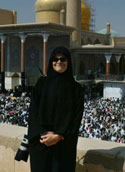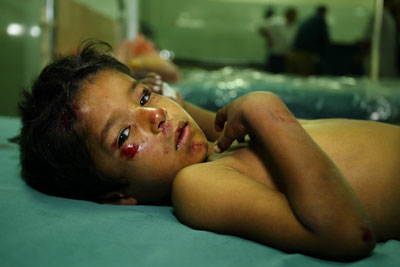 |
 |
Trauma
November 2003
|
 |
|||||||||
|
I'm in Baghdad, the well-armed, lawless capitol city where the security situation has been deteriorating at a steady pace. I've been here for six and a half weeks. There is now a large number of frustrated, rather angry Iraqis who are sick and tired of the guerrilla war, especially with so many recent casualties.
At night in the Al Hamra Hotel, most journalists casually speak about mortar attacks, because, over a beer or wine, we believe that it would be rather unlikely that we would be car bombed. However, last Friday 3/4 of the guests (including myself) evacuated after serious security threats forced us out. Now everyone is back again and we are happy campers for the time being.
Within this atmosphere of violence and occasional mayhem I decided it was time to do a story from the Iraqi side, putting a human face to it. I started a photo essay on the emergency room at the Al Yarmouk hospital, Baghdad's largest trauma facility.
So, what is normal here in the capitol city? Things have changed a lot post-Saddam. Under the oppressive regime there were a lot more rules and regulations that had to be followed, people were on a very short leash. There is an obvious epidemic of violence besides the car bomb attacks and the improvised explosive devices that end up killing Iraqis as much as they do the soldiers. People are emotional, they're acting out, and they have guns.
Over the next few visits I saw things that pulled at my heart. There was a 65-year-old woman who got hit over the head with a gun while robbers stole her purse and gold necklace at a bus stop. Her head was bleeding and she was in a lot of pain but said to me, "See what has happened to this country! They even attack an old woman." There were three school children who were heading home from school when they got hit by a car. Later that day a 17-year-old boy was walking down the street past two gunmen having a fight when he took a bullet at close range directly into his scull.
The hospital kindly supplied me with my own security man armed with an AK-47 because, I was told, it would be a good idea just in case the emotional relatives went off on a rampage of anti-American feelings. One night I needed it. After a shoot-out, four Iraqi men came in barely alive, with gunshot wounds, and a fifth man was in serious condition. Moments later family members began to arrive and the place overflowed with emotion. As I started to document the scene some of the relatives told the security that if I didn't leave that they would kill me. One woman screamed at me that this was my entire fault even though my translator kept on saying that I was just a photographer from Canada. I left rather quickly not wanting to end up as a patient.
I finished the E.R story feeling I had witnessed something important and meaningful. I want to go back there a few more times before I leave, maybe because it's a slice of real life here, and as stressful as this place is, I want to experience as much as possible and comeback in one piece. So far so good.
© Paula Bronstein
Getty Images
|
||||||||||
|
Write a Letter to the Editor
Join our Mailing List
© The Digital Journalist
|


